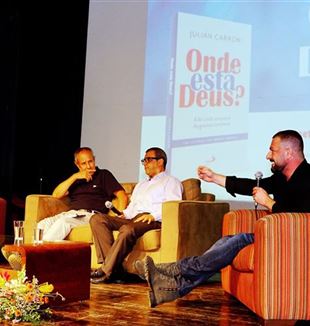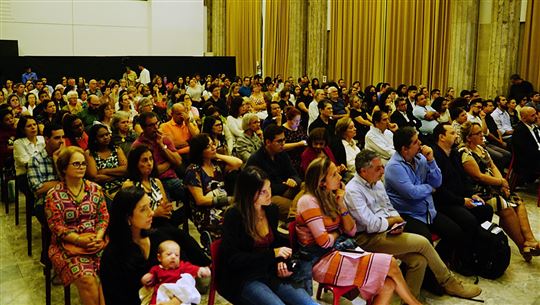
Rio de Janiero. “Do you know when words go straight to the heart?”
The presentation of “Onde está Deus?” (Where is God?) in Brazil. Julián Carrón spoke alongside psychiatrist and social network star, Italo Marsili. “Virtual relationships? They are effective when you reawaken desire in the other”.On the evening of Monday, September 9, there was a queue in front of the General Italian Consulate, in Río de Janeiro. People had arrived early to secure a place for the presentation of the book Onde está Deus? A fé cristã na época da grande incertezzaza (Ed. Paulus), by Julián Carrón. The meeting was hosted by the author, who was put into discussion with Italo Marsili, a doctor, who has made himself known on social media for his online courses, on themes of relationships, temperament and integration.
The discussion was moderated by journalist Fernanda Lanza and was divided into three blocks of questions. At the beginning, Carrón drew attention to the fact that "we have to talk about things from the experience we have of them in our lives". The provocation arose from the observation, found right at the beginning of the book, which says that in today’s secularized world Christianity no longer makes sense for many people. Why is this backdrop an opportunity for recovery? In response, Carrón began by quoting philosopher Hannah Arendt: “‘Crisis forces us to reconsider our questions'. Having a family, or enjoying your work should no longer be taken for granted. And this challenges the experience of all of us, from when we get up in the morning. And if we don't censor these questions, it can be an opportunity for us to pose them again to ourselves. This is an opportunity for me, because, through these questions, we can grasp, in reality, the signs of an answer. When I have questions, I can grasp the answers that I had before my eyes and could not see.”
Marsili said that he agreed with the value of this moment. "I'm not sorry for what we've lost. I agree that this is a good time to look at the issues. The whole of history is based upon dialogue.” He then alluded to the judgment of Socrates and Pilate’s position in front of Christ, in order to give an example of how we are always looking for explanations, but are not always open to recognize the truth that we have before us. "We enter into a world in which only the encounter, the embrace, the surrender to the experience, can give us a meaning. The idea behind my work on social media is to place people in front of their hearts. A person, with my same desires and frustrations, is in front of me. And it is here, in this secular world, that we must put our hearts into play.”
Then they talked about freedom. For Marsili, "man is an animal who does not know what to do in the face of reality.” And in his experience as a psychiatrist, who deals with many people, "choices before the truth are what generate life’s intensity.” Carrón dwelt on this subject at length. He began by recalling Dostoevsky's question: "Can a man of our time - with the desire to use reason, to be free, not to give up his humanity - really believe in Jesus Christ? That is, is Jesus Christ really interesting for him? This is the concrete question of our age. Secularization has led us to believe that we can do without the one who has dominated history for centuries, as if He were an obstacle to us being ourselves.” He launched a provocation on this subject: "Are those who have lost the meaning of things people who do not use reason and are deprived of freedom? Perhaps we should ask ourselves if we Christians are witnesses of what Christ has brought, with such fascination that we can challenge the people of our time by showing a more interesting reality for their lives. There is no other way to communicate the truth in our time but by challenging the reason and freedom of each other.”
Then Carrón used some examples to help us understand, leaving everyone amazed, including the other speaker. "Today, many people do not want to get married because they have seen the failed marriages of their parents or friends. They are not against Christianity, but they have not seen a lasting love. I have friends in Milan who have met other couples who were living together, but who did not want to hear about marriage. When they saw something different, they were challenged. No way of thinking will touch them in the depths of their hearts if they don’t see its physical fulfilment. But when they saw those families, the relationship between the couple, their relationship with their children, they saw such a beauty that they decided to get married. And why is that? Because they didn't want to lose the beauty of what they had seen. What moved them was the fact that they were challenged by seeing, realized before their eyes, what they thought impossible. That is why I say that Christianity communicates itself through envy". He took it a step further: "If this is Christianity, it doesn't need any hegemony, it doesn't need to force anything. One only has to stand in front of the other, challenging their desire to be happy. Therefore, Christians have the opportunity to testify, with experience and not only through discourse, the fact that those who follow Christ live everything a hundred times better".
Continuing, he recounted another episode: "When a person meets a nurse who comes into the operating room with a smile, the natural question they pose is: "Are you already happy in the morning?” Who wouldn't want to go to work happy? Life is complicated for everyone, but sometimes you meet someone who, despite complications, challenges the scepticism of everyone around them with their smile. Christ entered history in order to manifest himself, incarnated in people - not in a theory, not in a project, not in a hegemony, not in any form of coercion – in a person through whom this life is fulfilled. This is the contribution that Christians can make in today's society, for all those who wish to find the way to fulfilment.”
Concluding the meeting, Lanza asked him a question about the subject of mercy, addressed in the book’s second chapter. Carrón recalled how Don Giussani said that the word mercy should be abolished from the dictionary, because it is impossible for men to be merciful. He recounted the example of a couple of friends living in Japan and a Japanese woman working in their house; the latter, seeing how the mother always forgave her children and always forgave her, whenever she made mistakes, decided to leave. "Mercy was something so incomprehensible for this person that she could not stay there. We must be forgiven to forgive the other.”
Marsili recalled a friend, in whom he saw this ability to look with mercy, and how this fact touched him. Then he commented on the passage from the book that recounts Andrew the apostle inviting his brother. "At first, Peter did not see Christ, along the Jordan, but I can imagine how he looked at Andrew's face, and it's fantastic, because it's something that communicates itself through envy. And Peter said: ‘I have to go and see’. And on the Internet I don't consider myself an example at all, but people follow me, I believe, because I speak about the fundamental things of the heart. There are thousands of people on the other side that I have never seen, but you have the impression that you know each other, because you are talking about human things. I really do believe that virtual relationships are effective, because the relationship happens when it reawakens desire in the other.”
After the meeting, conversation continued within different groups that met to have dinner together and talk about what they had heard and what had struck them. Stella, for example, told her friends, "Do you know when words touch us? When they go straight to the heart? With no impressive sentences and no frills, when themes are fundamental to every human being who seeks truth and meaning in existence? Well, this meeting has been like that".
#WhereisGod?